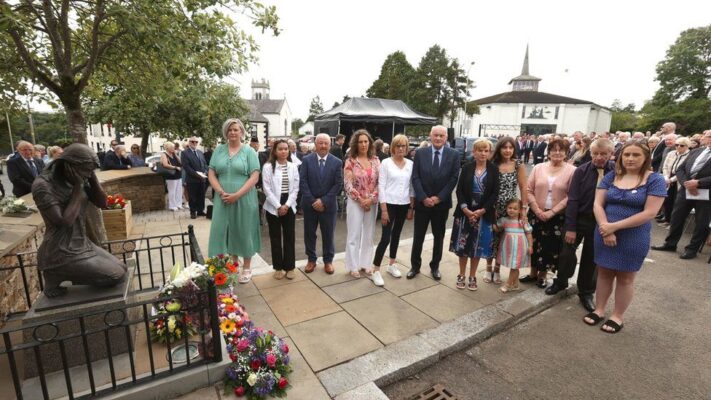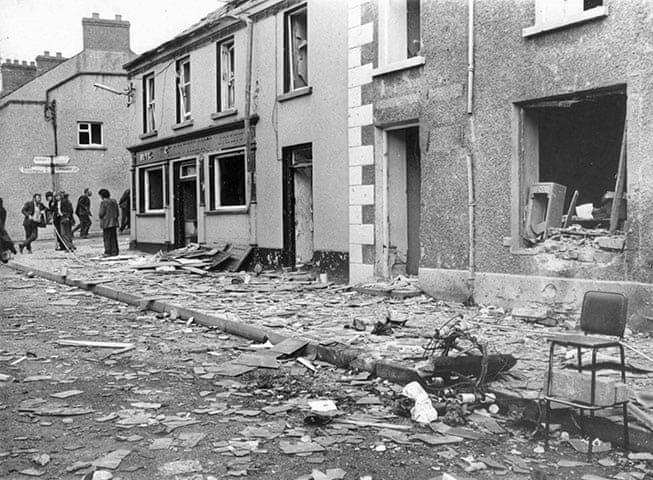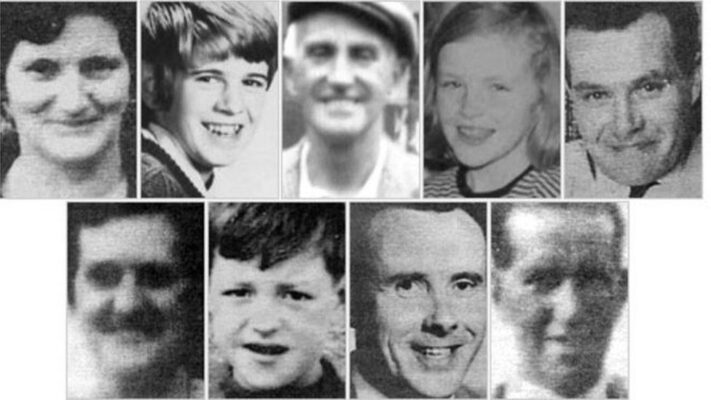 A memorial service has been held in the County Londonderry village of Claudy on the 50th anniversary of a multiple bomb attack that killed nine people.
A memorial service has been held in the County Londonderry village of Claudy on the 50th anniversary of a multiple bomb attack that killed nine people.
Three bombs exploded within 15 minutes in the village on 31 July 1972.
The victims were both Protestant and Catholic and included an eight-year-old girl and two boys aged 15 and 16.
Sunday’s service was attended by people injured in the bombs as well as the victims’ relatives, some of whom said they fear they will never get justice.
Among those killed in the attacks were people who ran to help their friends and neighbours who had been injured in the first bomb, only to be caught up themselves in the subsequent explosions.
The IRA was blamed for bombing Claudy but the paramilitary group never admitted to it and no one has ever been convicted.
A Catholic priest was long suspected of involvement in the bombings, but he was never questioned by police and he died in the Republic of Ireland in 1980.
“Whoever did it, leave them to God now, he will deal with it,” Anne Bradley, who lost her husband Arthur Hone, said.
“No one is going to come forward and say that they did it. I don’t think we are ever going to get an investigation or ever going to get justice.”
It was the day, she said, the “world collapsed around her”.
She had been at home that morning in her house on Main Street in the village where she lived with her husband Arthur, and their children, six-year-old Paul and four-year-old Michelle.
Just after 10:00 Mrs Bradley heard a loud bang. In an instant she ran out the door and into the street.
Arthur, she said, had left home early to make a phone call. He’d taken their daughter Michelle with him into the village.
As she ran, a woman come towards her carrying an uninjured Michelle.

The aftermath of the Claudy bomb in 1972
Anne had ran into the immediate aftermath of the first explosion, then the second and third bombs exploded.
“There was black smoke, people screaming, dust, slate stones and glass, everything flying, a large piece of a car landed at my feet,” Mrs Bradley said.
“It was a trap. No matter what direction you went in there was a bomb.”
When she saw her husband in hospital he was unconscious.
“But I was told to speak. I told him Paul, Michelle and I were alright and he definitely moved his hands, moved his fingers, made some movement but he never spoke,” she added.
Arthur Hone was the last of the nine people killed in the bomb attack to die. He never regained consciousness and died 12 days later.
The other people killed were Joseph McCloskey 39, David Miller aged 60, James McClelland 65, William Temple 16, Elizabeth McElhinney 59, Rose McLaughlin aged 51, Patrick Connolly, 15 and Kathryn Eakin, who was 8 years old when she died.
Other families also say they deserve to get answers.
In a statement marking 50 years since the bombing, the family of Rose McLaughlin said the families “have been continually failed by those who we had placed our trust in to serve this justice”.
The great-niece of Jim McClelland said 50 years on “and the pain and trauma are still unbelievably deep”.
There’s also a sense of anger, Tracey Deans McClelland added.
“How do you do that, come into a village the size of Claudy and plant three bombs, and sail off?”
Mark Eakin’s sister Kathryn was the youngest victim.
Investigators, he said, should “be left alone” to carry out their work “free from interference from states, governments, or anybody else who has a finger in the pie”.
“Just let them do the job, and hopefully they can come up with some answers,” he said.
In 2010, a Northern Ireland police ombudsman’s report said detectives had concluded that the late Father James Chesney, who was later moved to the Republic of Ireland, was a suspect.
It said the police, the state and the Catholic Church had covered up his suspected role in the bombing.
No action was ever taken against Fr Chesney, who died in 1980.
In 2013, some families started legal action against the Catholic Church, the police and the government.
Last year three families settled action against the PSNI and Northern Ireland Office (NIO).
At that time, the Temple, Miller and McClelland families said that “they were deeply disappointed in the lack of a proper investigation into the murder of their loved ones”.
David Temple, whose 16-year-old brother William was killed, said legal action against the Catholic Church was still being progressed.
“There are people in Claudy still looking for answers. My mother went to her grave at the age of 91 without getting answers.
“I pray every day this will be achievable, the battle will continue on.”
Claudy “deserves answers from the Catholic Church”, he said.
A spokesman for the Catholic Church in Ireland said it would be inappropriate to comment at present as “matters relating to the bombing are currently the subject of litigation and are before the courts”.
The Catholic Bishop of Derry Donal McKeown said anyone with information should come forward so that “a little drop of truth will at least sooth that fire that burns in the hearts of so many”.
Bishop McKeown said that the Catholic Church had handed over all information about the attack to the authorities.

Nine people died when three bombs exploded in Claudy. From top left: Rose McLaughlin; Patrick Connolly; David Miller; Kathryn Eakin; Joseph McCluskey; Elizabeth McElhinney; William Temple; Arthur Hone and James McClelland
“On the 50th anniversary of the Claudy bombing, our thoughts are with the relatives of the deceased and the survivors.”
The police investigation into Claudy is at a standstill.
Det Ch Supt Ian Saunders, of the PSNI’s Legacy Investigation Branch, said he understood those affected “feel as though they have unanswered questions and that justice has not been provided to them”.
“The atrocity has been the subject of a number of investigations by the police and all available lines of enquiry have been pursued,” he added.
He said an internal review of the case was carried out in 2002/3 which led to a number of recommendations.
“Those recommendations were progressed and four people, three men and one woman, were arrested as a result in November 2005,” Det Ch Supt Saunders said.
At the time, he added, the Public Prosecution Service “directed that no prosecution should take place”.
A number of witnesses were re-interviewed in 2013/2014 but “no new evidence was obtained that would have allowed us to further the investigation”.
Tags:




